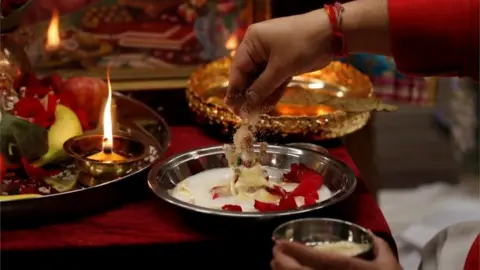Hindu scriptures can 'inspire greener living', eco-activists say
 Reuters
ReutersAn environmental group is using Hindu scriptures to inspire people to make greener choices in their lives.
Hindu Climate Action has been working with temples to be less wasteful during religious festivals.
Co-founding member Priya Koria, 21, from Bristol, said: "There's a big lack of representation in terms of the Hindu community of the climate activism front, especially I think in the UK."
Due to coronavirus, the group has moved its work online to spread the message.
 Rajesh Purohit
Rajesh PurohitMs Koria, a chemistry student at the University of Bristol, added that festivals did tend to use a lot of flowers, rice and other materials.
During the Rakhi festival the bond between siblings is celebrated where, traditionally, the sister ties red string on her brother's wrist to pray for his health and prosperity.
"Typically, for Rakhi, we have flowers, rice and a lot of that stuff that typically won't be sourced in an environmental way just because in terms of tradition of how it's been done for so long," said Ms Koria.
"There's never really been alternative or better ways suggested."
The group's co-founder, Rajesh Purohit, 26, from Leicester, said: "The Maharabat talks about not displaying malice towards any living beings through your actions or words and having that level of kindness and giving in charity.
"It signs off by saying that is Sanatana dharma - that is Hinduism. That is what we're trying to achieve - we're trying to drive that level of giving back.
"Just as Mother Earth gives to us, let's aim to give back."
The group has convinced Wellingborough temple, in Northamptonshire, to stop using single-use plastic cutlery, but it is these "little actions" they say will translate to a "bigger picture".
"For me it's about using things wisely. When you do pujas, you don't need to use gallons of water or loads of flowers," added Mr Purohit.
 Priya Koria
Priya KoriaHe added that traditionally Hinduism was a vegetarian faith, saying it has less impact on the environment.
Buying less, using less energy in the home and adopting more sustainable pollution-free ways to travel are also part of their core message to the Hindu Diaspora across the UK.
Ashok and Hema Patel run the Hindu Cultural Association in Gloucester and both felt adding a religious slant was not always the best way forward.
"Hinduism is a very individual religion, where everyone has their individual perspective of that religion," said Hema.
"There a lot of people in many parts of India who do eat meat. The thing is to educate people on how important it is in terms of climate change but nobody should be forced."
 Hema and Ashok
Hema and AshokOver the past 10 years, the group has run educational trips for their members.
They also use reuseable and biodegradable items for festivals, such as clay for making figurines during Ganesh Chaturthi, which celebrates the birth of Lord Ganesh.
"Even if it's a small thing you do, it helps," said Mrs Patel, adding that picking up plastic on walks can help.
"We try to keep the countryside clean and make kids and adults aware and get them to look at their surroundings."
The Swindon Hindu Temple opened in 2016 where flowers are grown within the temple grounds for ceremonies.
Milk donated to celebrate Lord Shiva's birthday is used to make devotional food offered to the deity.
 Hindu Eco Network
Hindu Eco NetworkAfterwards this is shared out to temple-goers after prayers.
Temple chairman Pradeep Bhardwaj agreed that most Hindus were not vocal about environment issues but believed it was "deeply embedded in the Hindu consciousness".
"What we have to recognize as Hindus, and obviously as human beings, is the kind of small, small things we do on a day-to-day basis," he said.
"This planet is the most important thing that we have got collectively as a human race and we should do whatever it takes to not just respect and sustain, but to enhance our planet."

Follow BBC West on Facebook, Twitter and Instagram. Send your story ideas to: [email protected]
